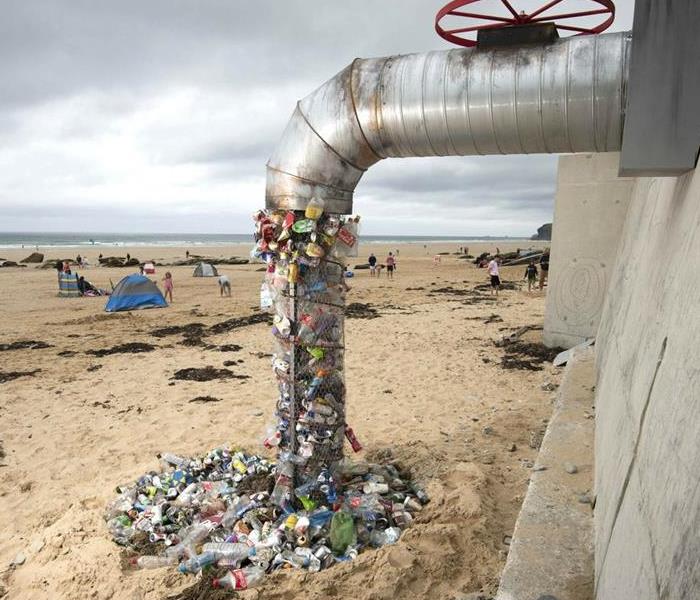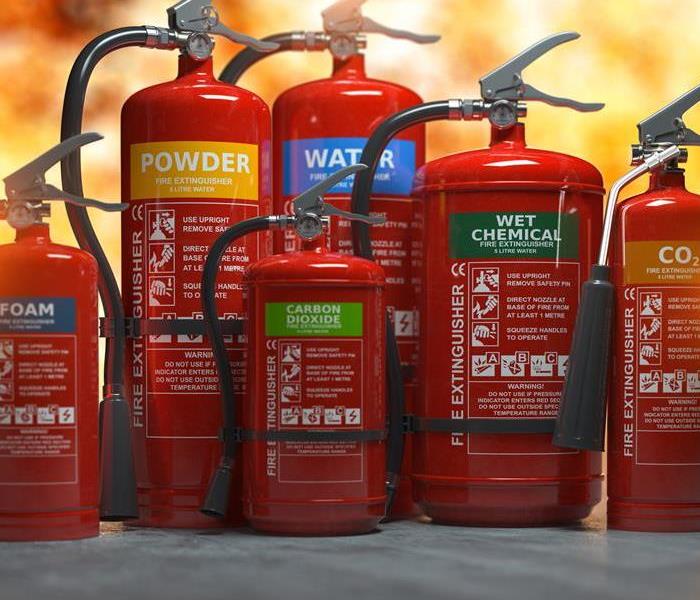Recent Posts
How to Clean Up Sewage Damage
6/5/2024 (Permalink)
Sewer cleanup calls for measures that go beyond the recommended treatments for damage caused by clean water. Find out how mitigation professionals respond to a sewer backup at a commercial building in Cumming, GA.
Remove Standing Water and Solids
The first step in cleaning up sewer damage is to remove contaminated water and solids. This may call for the use of a
Some pumps are designed to eliminate liquids and solids. It may be possible to rent cleanup equipment or hire a restoration service.
Tear Out Porous Materials
Porous building materials and contents absorb contaminated water. These items should be torn out or disposed of due to the difficulty of disinfection and the risks of mold growth or recontamination. Damage restoration professionals can recommend which materials or items must be removed. If water damage is caused by clean water from a broken supply line, most items can be air-dried.
Clean and Disinfect
Sewer cleanup involves the additional step of disinfection. Regardless of whether water damage is Category Two gray water or Category Three black water, a building owner should
- Remove all water and debris
- Clean the affected area
- Disinfect the affected area
Experts may also pre-treat an area with disinfectant prior to tearing out damaged materials. Another round of treatment is necessary to ensure that contaminants do not remain after the tearing-out process.
Dry and Lower Humidity Levels
Once cleanup is complete, it is important to dry the area affected by a flooded toilet or sewer backup. This may be done with air-drying, dehumidifiers, or ventilation. Wait until the area is dry before completing the restoration. Rushing through the end of the mitigation process may increase the risk of secondary damage.
Sewer damage is likely to involve contaminated water. A sewer cleanup service can quickly restore the damage and recommend solutions to property owners in Cumming, GA.
What To Know About Your Smoke Alarm
6/5/2024 (Permalink)
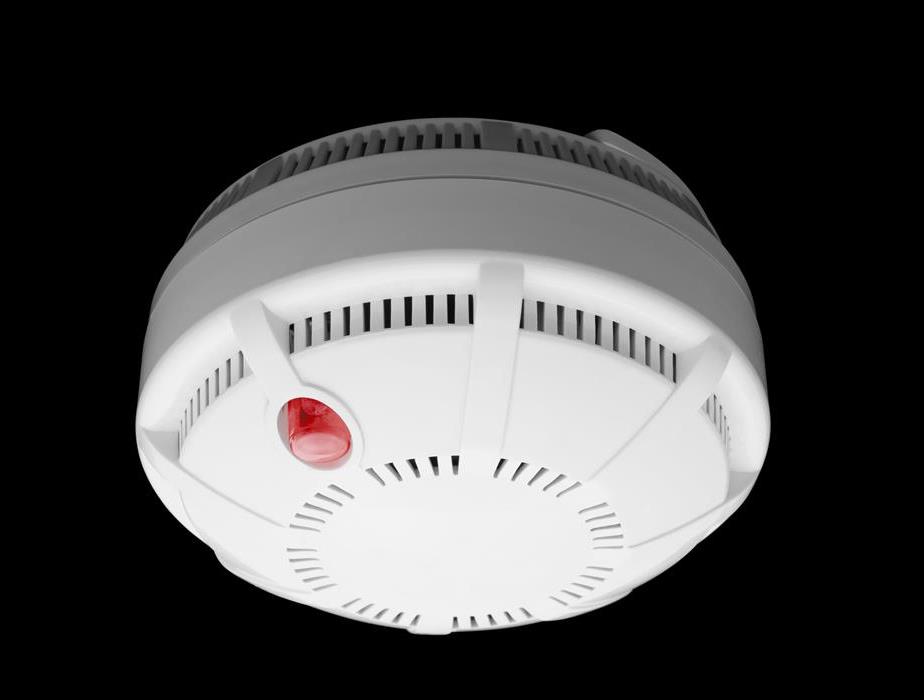
Most homes in Marble Hill, GA, have at least one smoke alarm installed. In fact, this important piece of equipment is required by most fire ordinances. Many fire damage restoration professionals agree that proper maintenance can help ensure the alarms in your home remain in working order. Here are some tips you may wish to know.
1. When To Replace the Alarm
A smoke detector is designed to have a long life, so you can expect yours to last for up to 10 years. Each alarm should have its manufacture date printed on the back so that you can check it if needed. If your alarm is over 10 years old, it may be time to consider a replacement.
2. When To Replace the Batteries
Many experts recommend changing the batteries in your smoke alarm at least once a year. It’s recommended to choose a consistent time every year, such as daylight savings, so that it's easier to remember to change them out. After replacing the batteries, it’s advised to hit the test button on your alarm to help ensure the appliance is in working order.
3. Where To Install the Alarm
One of the most commonly asked questions is where should alarms be installed in the home. Experts recommend installing them on every level of the home, inside each bedroom, and outside the bedrooms as well. For example, you can place a single alarm in the shared hallway outside several bedrooms with a smoke detector inside each individual bedroom. You may also want to include an alarm in your kitchen or main living area.
With the proper maintenance, your smoke alarm should stay in working condition for 10 years. Remember to replace the batteries and test the alarm regularly to help ensure functionality. It’s also a good idea to ensure that every level of your home has a working alarm along with one in each bedroom.
How To Choose The Right Extinguisher
6/3/2024 (Permalink)
Keeping a fire extinguisher in your home can save you and your property from a small fire. However, there is a wide selection of fire extinguishers to choose from and they are all intended to be used for different fires.
Extinguisher Classes
Each class of extinguisher fights a different type of fire:
Class A: Wood, paper and trash
Class B: Grease, oil-based liquids and gasoline
Class C: Electrical equipment
Class D: Flammable metals
Class K: Animal and vegetable oils used in cooking
Household extinguishers are rated A, B or C. On the label, the numbers that precede the letters give the rating of the extinguisher's effectiveness against that type of fire. An extinguisher with a 4-B rating, for example, is more effective against a grease fire than one rated 2-B. Higher effectiveness usually means a higher-priced extinguisher. There is no number designation for Class C.
Extinguisher Sizes
You can choose your extinguisher size based on where you will use it. A 5-pound extinguisher is suited for a typical home fire and is easy to pick up and use. A 10-pound fire extinguisher is a good choice for the garage, where a fire may grow before you see it. You can also find stove-top extinguishers that mount above the range.
Best Extinguisher Locations
Safety experts recommend you keep an extinguisher on each floor of your home for maximum fire preparedness. The kitchen is an ideal place because of the enhanced risk of fire in that room. Keep the extinguisher where household members can reach it quickly and easily. The best location is near an exit if the fire gets out of control and you must evacuate.
Equipping your home with the right fire extinguisher can save your home and your family. It is better to be safe than sorry.
Understanding Flood Restoration with SERVPRO of Forsyth and Dawson Counties
8/14/2023 (Permalink)
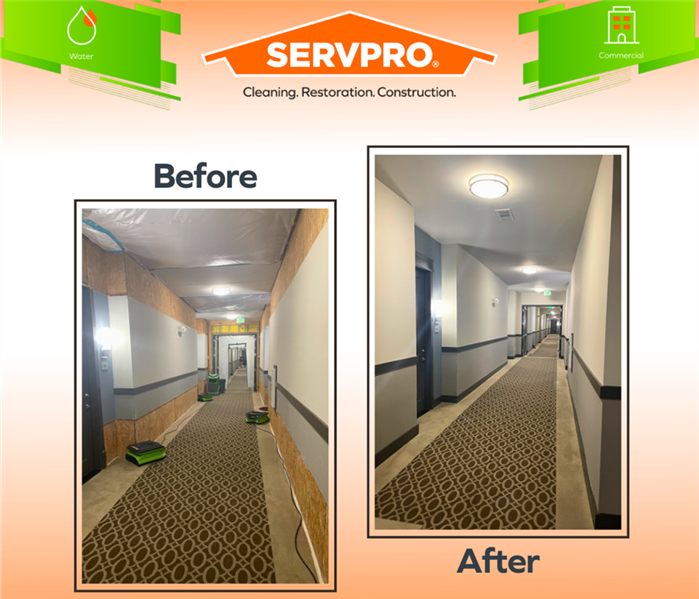 SERVPRO of Forsyth and Dawson Counties is here to help you 24/7/365 with all of your commercial and residential flood restoration needs.
SERVPRO of Forsyth and Dawson Counties is here to help you 24/7/365 with all of your commercial and residential flood restoration needs.
Flooding can cause significant devastation, leaving homeowners and businesses grappling with the aftermath. From damaged belongings to structural threats, the effects of flooding are far-reaching. But there's hope on the horizon – and it goes by the name of "flood restoration." For residents and businesses in Forsyth and Dawson Counties, SERVPRO is your first port of call when dealing with flood-related damages.
What is Flood Restoration?
Simply put, flood restoration is the process of cleaning, repairing, and restoring (or replacing) everything that has been damaged by water. It's a multifaceted process that involves numerous steps, from water extraction and drying out affected areas to repairing structures and ensuring the environment is safe from potential health hazards like mold.
Why is it Essential?
After a flood, it might seem like your home or business will never be the same again. Water can damage everything it touches, including your walls, flooring, furniture, and personal belongings. Even after the water recedes, the moisture it leaves behind can lead to mold growth, further harming your property and potentially your health.
But with prompt and effective flood restoration, you can bring your property back to its original state, ensuring it's safe and comfortable once more.
SERVPRO's Approach to Flood Restoration
SERVPRO of Forsyth and Dawson Counties takes a systematic approach to flood restoration:
Immediate Response: Time is of the essence. Our team is available 24/7, ensuring that we can get to your property quickly, mitigating further damage.
Assessment: Before diving in, we conduct a comprehensive assessment to determine the extent of the flood damage. This step is crucial as it helps tailor our restoration efforts to your property's unique needs.
Water Extraction: Using state-of-the-art equipment, we remove standing water, reducing the risk of mold growth and structural damage.
Drying and Dehumidification: Once the bulk of the water is removed, our team uses specialized equipment to target moisture within walls, floors, and other hard-to-reach places.
Cleaning and Sanitizing: Floodwaters often introduce harmful bacteria and contaminants. Our team ensures your property is thoroughly cleaned and sanitized, making it safe for all inhabitants.
Restoration: The final step involves restoring structures and items to their pre-flood condition. This might entail minor repairs like replacing drywall or more significant efforts like rebuilding entire rooms.
Trust the Experts
When faced with flood damage, it's natural to feel overwhelmed. However, with the expertise of SERVPRO of Forsyth and Dawson Counties, you can rest easy knowing your property is in capable hands. Our dedicated team, equipped with the latest technology, is committed to making flood damage "Like it never even happened."
If you've experienced flooding, don't delay. Reach out to SERVPRO of Forsyth and Dawson Counties today and let our flood restoration specialists bring your property back to life.
Future-proof Your Home: The Importance of Waterproofing and Water Damage Restoration
6/5/2023 (Permalink)
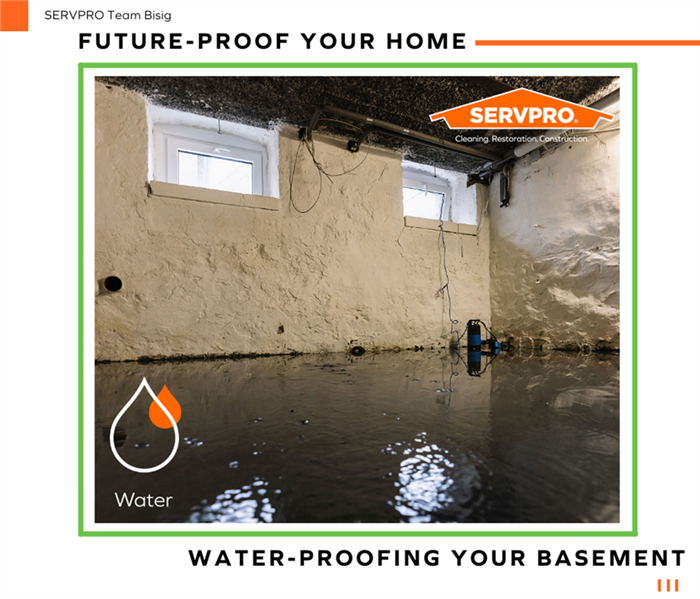 SERVPRO of Forsyth & Dawson Counties is here to serve you 24/7/365 whether you live in Big Creek, Cumming, Vickery, Chestatee or anywhere in between.
SERVPRO of Forsyth & Dawson Counties is here to serve you 24/7/365 whether you live in Big Creek, Cumming, Vickery, Chestatee or anywhere in between.
Owning a home is one of the largest investments you'll make in your life here in Forsyth County, GA. To protect this valuable asset, it's crucial to be proactive in your home's maintenance, particularly when it comes to preventing water damage. Investing in waterproofing and securing professional water damage restoration services at the first signs of trouble are key actions to ensure the longevity of your property.
Proactive Waterproofing: A Stitch in Time Saves Nine
Embracing a proactive approach to waterproofing your home could save you both time and financial distress in the future. While the initial cost may seem substantial, the return on your investment in the long run makes it a worthwhile endeavor.
The Need for Waterproofing in Different Home Structures
The basements found in Georgia homes can vary widely, and so do their waterproofing needs. Whether your home has a full basement, partial basement, or a crawl space, each of these structures comes with its own set of challenges. For instance, a full basement offers more livable space but also presents a larger area susceptible to water intrusion. On the other hand, crawl spaces may seem less vulnerable due to their limited size, but they can harbor moisture leading to mold growth and structural damage if not adequately protected.
Methods of Home Waterproofing
Waterproofing methods differ based on the type of basement in your home and the specific needs it presents. Here are some of the common methods:
- Interior Waterproofing: This is often a go-to method when an existing issue needs addressing. It might include the application of sealants on interior walls and floors, which can prevent minor condensation and dampness.
- Exterior Waterproofing: This involves applying a waterproof coating or membrane on the outside of the basement wall, which prevents water from making its way into the structure. This method is generally more expensive but offers more comprehensive protection.
- Drainage Improvements: Proper drainage is essential to prevent water accumulation around your home's foundation. Techniques may include installing French drains, sump pumps, or regrading your lawn to direct water away from your house.
- Crawl Space Encapsulation: This method involves installing a heavy-duty water vapor barrier along the entire crawl space, including the floors, walls, and even the ceiling. This barrier protects the crawl space from ground moisture and helps maintain the structural integrity of your home.
Waterproofing your basement, whether full or partial, or even your crawl space, provides robust protection against persistent dampness that can lead to structural weakening. By preventing future water damage, this preemptive measure guards against costly repair and restoration work down the line. Additionally, a well-maintained, waterproofed home can be a significant selling point, enhancing your property's value should you decide to put it on the market. In essence, waterproofing is an investment in the longevity and value of your home.
Immediate Action: The Role of Water Damage Restoration
Despite all precautions, water damage can still occur in your basement, perhaps due to unforeseen circumstances such as severe weather events. In these instances, it's essential to act swiftly and secure professional water damage restoration services. The quicker the response, the lesser the damage inflicted, and the lower the overall restoration cost.
A professional water damage restoration service, such as SERVPRO of Forsyth and Dawson Counties, brings to the table extensive knowledge, experience, and cutting-edge equipment. They will not only fix the visible water damage but also detect and remediate unseen issues, including hidden moisture, mold growth, and structural instability.
The Combined Power of Waterproofing and Water Damage Restoration
Waterproofing and water damage restoration services work hand in hand to secure your home's future. Waterproofing acts as your first line of defense against water damage, while restoration services help to repair and recover your property in case water damage does occur. Together, they provide a comprehensive solution to protect your home from the destructive impact of water.
Remember, investing in your home today through preventive measures like waterproofing and engaging reliable water damage restoration services when needed can save you time, money, and stress in the future. Our team of experienced professionals is ready to ensure your home stands the test of time. Contact us today to learn more about how we can help safeguard your home from water damage.
Decoding the Role of Protimeters in Efficient Water Damage Restoration
5/30/2023 (Permalink)
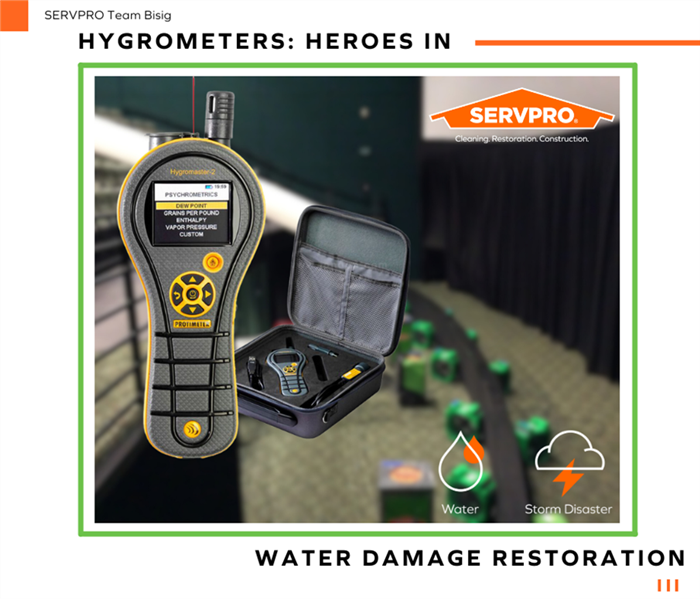 The Protimeter Hygromaster 2 is an effective protimeter that our SERVPRO technicians use here in Forsyth County, GA.
The Protimeter Hygromaster 2 is an effective protimeter that our SERVPRO technicians use here in Forsyth County, GA.
When it comes to effective water damage restoration, specialized tools play an integral role in the process. One of these instrumental devices is a protimeter, a tool that offers precise moisture measurements, which is paramount in dealing with water damage. Here at SERVPRO of Forsyth/Dawson Counties, we use these valuable tools to deliver the best possible service to our customers.
What is a Protimeter?
A protimeter is a type of moisture meter that professionals in the water damage restoration industry frequently use. This handheld device aids in identifying hidden moisture content within various surfaces, ranging from walls and ceilings to carpets and wood. By using a protimeter, our restoration experts can locate the exact source of water intrusion, monitor the drying process, and ensure the affected area is completely dry before completion of the restoration process.
How Does a Protimeter Work?
Protimeters function using two methods: pin and pinless.
The pin-based protimeter uses two electrodes that penetrate into the material to measure the electrical resistance, with higher moisture content resulting in lower resistance. On the other hand, the pinless protimeter uses an electromagnetic field to identify moisture without causing any surface damage.
These devices are invaluable in water damage restoration, allowing professionals to rapidly assess the extent of water damage, pinpoint hidden moisture, and verify the success of drying operations. This ensures all areas, including those not easily seen or reached, are adequately dried, mitigating risks such as mold growth and structural decay.
The Role of Protimeters in Water Damage Restoration
In water damage restoration, timing and precision are crucial. By using protimeters, our SERVPRO of Forsyth/Dawson Counties teams can swiftly identify the scope of water damage and formulate a tailored restoration strategy. Post-restoration, protimeters help confirm that the moisture levels have returned to normal, safeguarding your property from potential long-term water damage effects.
With the use of advanced tools like protimeters, our SERVPRO team ensures effective moisture detection, a key step in the restoration process. It enables us to provide high-quality services, restoring your home or business to its pre-water damage condition efficiently and effectively.
Protimeters: Ensuring Comprehensive Restoration
Investing in water damage restoration is about more than just removing visible water; it's about ensuring your property is thoroughly dried to prevent future problems. At SERVPRO of Forsyth/Dawson Counties, our use of tools like protimeters is a testament to our commitment to deliver comprehensive and professional restoration services.
Water damage can be deceptive, seeping into structural cavities and trapping pockets of saturation. Detecting water within these areas can prove challenging without the right equipment. At SERVPRO of Forsyth/Dawson Counties, we employ state-of-the-art tools, like protimeters, to ensure that all hidden moisture is detected and addressed, offering peace of mind to property owners.
For professional water damage restoration services you can trust, contact SERVPRO of Forsyth/Dawson Counties. We’re here to restore your property "Like it never even happened."
5 Tips To Prepare Your Business In Forsyth County For Tornado Season
3/24/2023 (Permalink)
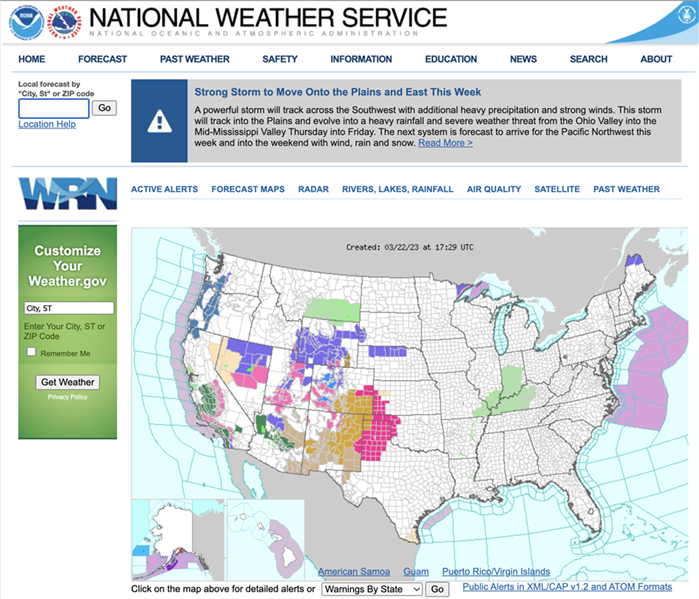 Weather.gov is a great resource to view your area's current and historical weather here in Forsyth County, GA.
Weather.gov is a great resource to view your area's current and historical weather here in Forsyth County, GA.
As tornado season approaches, it is important for those in Forsyth County to be prepared. Businesses of all sizes must be ready for the unpredictability of severe weather and the possibility of a tornado occurring. With some simple steps, businesses can ensure they are ready and protected from any potential danger. In this article, we will provide five tips to help prepare your business in Forsyth County for tornado season.
The severity of tornadoes varies greatly, and it is essential for businesses to understand the necessary precautions that should be taken when a warning has been issued. Preparation can mean the difference between life and death for those in the path of a tornado. It’s crucial to have an emergency plan in place that keeps employees safe and minimizes commercial property damage if a tornado does occur.
With these five tips, businesses in Forsyth County will have everything they need to protect their livelihoods from the threat of tornadoes this season. By following these precautions, you can rest assured that your business is as prepared as possible should disaster strike.
Understand The Risks
It's important for businesses in Forsyth County to understand the risks associated with tornado season. Tornadoes can cause extensive damage, so it's essential to be prepared. Knowing the potential risks is the first step to protecting your business.
Start by researching the tornado history of your area and understanding what types of tornadoes have been reported in Forsyth County. You should also look up information about current weather patterns and climate conditions that could lead to tornadoes. This will help you understand how severe they could potentially be if they occur in your area during this season.
You should also familiarize yourself with what type of structures are vulnerable to tornado damage, such as mobile homes or buildings with weak foundations like external storage sheds. Having an understanding of which structures are most at risk can help you better prepare your business for a potential tornado. With this knowledge, you can take actionable steps to ensure your business is safe from tornado-related damage.
By taking these precautions now, you'll be able to more effectively protect and secure your business from any potential harm that may come during tornado season here in Forsyth County.
Develop An Emergency Plan
Now that you have a better understanding of the risks associated with tornado season in Forsyth County, it's important to develop an emergency plan. This plan should contain steps that you and your employees can take to stay safe when a tornado is approaching or already on the ground. It should also address how you will respond if your business suffers damage from a tornado.
First, make sure that all employees are aware of their roles and responsibilities during a tornado warning or event. You should also create an evacuation plan so that everyone knows where they need to go in the event of a tornado. Include designated meeting spots both inside and outside the building so that everyone knows to gather there after evacuating. Additionally, it's important to do regular drills to practice this evacuation plan.
In addition, consider creating an emergency kit for your business that includes items like bottled water, flashlights, non-perishable food items, blankets, first aid supplies and any other necessary items for sustained periods away from the business premises. It's also important to have contact information for local emergency services and list any medical needs of employees that may require special attention in the event of an emergency situation due to a tornado.
By taking these precautions now, you can help ensure that your business is prepared for any potential tornadoes during the season ahead.
Secure Property And Equipment
It's important to secure property and equipment during tornado season. To do this, you need to make sure that all external windows are closed and locked. Secure furniture, computers, and other equipment by anchoring them to the walls or floors, if possible. Move any items that could become projectiles in strong winds inside your building or a secure storage area.
You also need to prepare for power outages by having a backup generator on hand. This will ensure that essential systems such as lighting, communications, and security can remain operational even when the power is off. Additionally, check all of your emergency supplies and restock if necessary. This should include flashlights with extra batteries, non-perishable food items, first aid kits, and plenty of bottled water.
Finally, prepare your staff for severe weather warnings by training them on what to do in case of an emergency such as a tornado. Make sure they know where to take shelter in the building or outside if needed as well as who is responsible for notifying emergency services. It's also important to have a plan for communicating with employees after the storm has passed so everyone can be accounted for quickly and easily.
Train Employees On Safety Procedures
It's important to train employees on safety procedures during tornado season in Forsyth County. Every office should have an emergency plan that outlines what staff should do if a tornado is approaching. The plan should include steps such as where to go and how to respond. All employees should be familiar with the plan and know how to execute it in case of an emergency.
Additionally, all staff should be trained on the basics of tornado safety. This includes understanding what a tornado watch and warning mean, knowing when to seek shelter, and understanding how to stay safe if caught outdoors during a storm. Employees should also be aware of the risks associated with severe weather conditions so they can make informed decisions about their safety during a tornado event.
Finally, employers should provide employees with access to resources such as online courses or materials that explain proper tornado safety protocols. By making sure everyone is properly trained and knowledgeable about emergency plans, businesses in Forsyth County can be better prepared for any potential storms during tornado season.
Stay Informed Of Weather Alerts
It is essential to stay on top of weather alerts in order to prepare your business in Forsyth County for tornado season. Monitoring local news outlets and signing up for emergency alert notifications can help keep you informed. Additionally, familiarizing yourself with the local warning systems and how they are activated is a critical step in staying ahead of severe weather occurrences.
The National Weather Service provides detailed information about current weather conditions and the potential for severe weather outbreaks. They use various tools such as radar and satellite imagery to identify impending storms and will issue warnings if necessary. Monitor their website or social media accounts for updates that could impact your business operations.
It is also beneficial to have a plan in place to inform employees of any impending danger from severe storms or tornadoes. Establishing an emergency alert system, such as text message or email alerts, to communicate quickly with staff during severe weather events can be instrumental in reducing risk and ensuring everyone's safety.
By staying informed with regular updates from reliable sources, ensuring everyone is aware of safety protocols and having an emergency alert system ready to deploy, your business will be well-prepared for tornado season in Forsyth County.
Commercial Systems Prone to Water Damage: SERVPRO of Forsyth & Dawson Counties
4/28/2022 (Permalink)
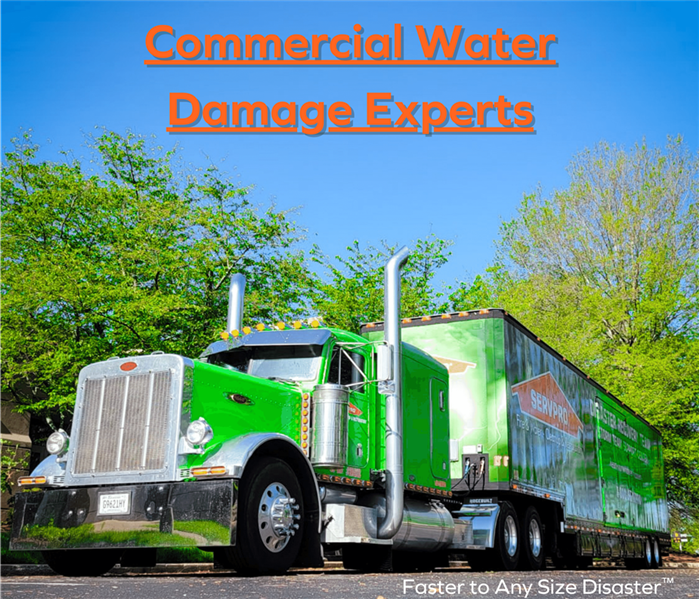 SERVPRO of Forsyth & Dawson Counties is ready for whatever happens! We'll restore your business after any size of property damage.
SERVPRO of Forsyth & Dawson Counties is ready for whatever happens! We'll restore your business after any size of property damage.
Commercial properties present unique risks when it comes to water damage in Cumming, GA. Unlike residential homes, which are usually one story and have easily accessible crawl spaces and attics, commercial buildings can be many stories high with flat roofs and multiple storefront windows. They also often have expensive specialized equipment that can be very costly to repair or replace if damaged by water. In this blog post, we will discuss the different parts of a commercial building that are at risk for water damage, as well as some tips on how to prevent it.
Plumbing Systems
The first and most obvious risk for water damage in a commercial property is the plumbing system. Because commercial buildings have more bathrooms, kitchens, and other water-using fixtures, they also have larger and more complex plumbing systems. These systems are often located in hard-to-reach places, making them difficult to repair if they spring a leak.
One of the main water damage challenges according to The Hartford Insurance is an improperly maintained sprinkler system. By law, most commercial buildings must have a fire sprinkler system, but many building owners forget to regularly maintain and test these systems. While a well-maintained fire sprinkler system can help prevent extensive fire damage in the event of a fire, improper maintenance or disaster planning can cause extensive water damage that can flood multiple floors.
Another plumbing risk is burst pipes. Commercial buildings, especially high rises tend to run at a higher pressure than residential buildings. Therefore, a burst pipe has the potential to release significantly more water than a home.
One of the ways in which we help commercial property owners prevent catastrophic property damage before it happens is through our app-based Emergency Response Planning program (ERP).
Roofing Systems
In addition to the plumbing system, there are a number of exterior commercial building components that can experience water damage. One of the most common is the flat roof. Because flat roofs are not sloped like traditional pitched roofs, they tend to pool water instead of shedding it. This can lead to leaks and eventually, if left unaddressed, major water damage.
Some common commercial roofing systems include:
- Built-up Roofing (BUR): Often called tar and gravel roofs, these commercial roofing systems are built with a semi-continuous membrane installed in layers, then covered in aggregate. While they are usually simple to maintain, best practices suggest inspecting the roof for deterioration and possible leak points at least twice yearly.
- Thermoplastic Single-Ply Membrane Roofing (PVC & TPO): These roofs are installed in large rolls that are then welded together at the seams with heat. The material is very durable and oil-resistant. However, the heat-welding methods require skilled installation, which can lead to weak points and leak-prone areas if not performed correctly.
- EPDM Roofing: Some roofers call these "rubber roofs" because the material they are made of, ethylene propylene diene monomer is very rubber-like. This kind of roof is derived from oil and natural gas, and appears dark gray or black. When installed correctly and with the highest thickness available, this type of commercial roof will last a very long time with little to no issues. Unless you experience storm damage in your area, an annual check for leaks around the roof penetrations should suffice.
Window Systems
Commercial window systems are built for durability and use, however, they can often present a unique water damage challenge for commercial facilities. Most aluminum glazing systems aren't intended to be 100% waterproof. Most commercial window systems are meant to limit water penetration during extreme circumstances while also weeping water back out to the exterior.
By directing all moisture to the sill flashing, storefront systems limit water penetration. It's critical that the sill flashing be installed correctly in order to avoid water damage. Making sure that sealant is put on the top of the rear leg before installing the sill is one of the most important aspects of a good installation.
The most essential aspect of maintaining water penetration with a storefront is end dam fastening and sealing. Water will enter the building through the jamb locations if end dams are not properly fastened and sealed. Improperly (or missing) end dams can cause significant water damage to the interior drywall or flooring around commercial storefront windows.
Like anything else in a building, time and the elements can cause wear and tear and failure of these commercial window water control systems.
Commercial Water Damage Inspection Services
So if you notice moisture or water damage around your storefront windows, you should consider calling SERVPRO of Forsyth & Dawson Counties to inspect for potential water damage issues. Our technicians are trained to identify, troubleshoot, and restore all types of commercial water issues.
Call today to schedule your commercial service!
(770) 887-1962
Tips to Stay Safe during Fire Damage: SERVPRO of Forsyth & Dawson
3/29/2022 (Permalink)
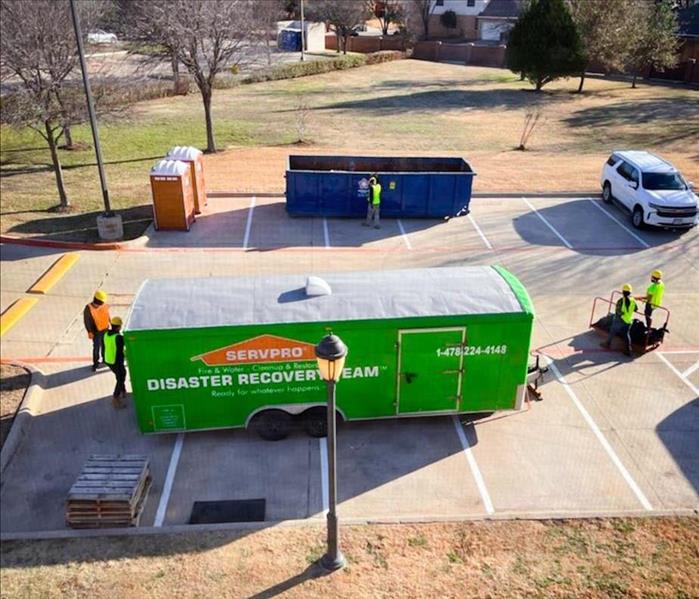 No matter how serious your property damage may be, SERVPRO of Forsyth & Dawson is your local expert for restoring your home or business.
No matter how serious your property damage may be, SERVPRO of Forsyth & Dawson is your local expert for restoring your home or business.
It's that time of year again - fire season in Forsyth County, GA, and surrounding areas. Between February and May, the weather gets hotter and drier, while the risk of house fires rises. A fire may start from a variety of sources, ranging from a faulty wire to an overloaded outlet to a kitchen mishap to a bonfire left unattended. It's critical to know how to react quickly and effectively if your home catches fire.
Here's What You Need To Know If A Fire Starts:
The first line of defense against a house fire is to know how to use the proper fire extinguisher for the situation. This simple procedure can help save lives and hundreds of thousands of dollars in property damage. If the fire spreads uncontrollably, evacuate immediately and stay away, then call 9-1-1. Leave all of your belongings where they are and save yourself and your loved ones.
If your clothing ignites, remember the old adage: Stop, Drop, and Roll.
It's critical to utilize the stairs if you live in a building with elevators in case of a fire. The elevator electrical system may be damaged by a fire, causing the shaft to operate like a chimney and rapidly fill up with deadly fumes.
Doors may be used to your advantage in a fire, potentially saving your life. If the doorknob or handle is hot, don't open it. If you can't exit through the primary route, look for another option. Do not open any doors that are warm to the touch.
Close any doors that might obstruct your exits, lay a wet towel beneath the doors, and call the fire department or 9-1-1 if flames, heat, or fire block your avenues of escape. Tell them exactly where you are so they can find you.
If you're near a window that you can't use as an escape, open it and wave a brightly colored cloth or use your phone flashlight to signal for help.
What To Do After a Fire
After a fire, it is important to contact a professional fire damage restoration company like SERVPRO of Forsyth and Dawson Counties. We have the training, experience, and equipment to properly restore your home - "Like it never even happened."
If you try to clean up the fire damage yourself, you could end up making the situation worse both in your home and with your insurance company's process.
Trust the experts, and call today!
Spring Weather Hazards in Georgia | SERVPRO® of Forsyth and Dawson Counties
3/25/2022 (Permalink)
 Extreme temperature changes can lead to severe weather. SERVPRO of Forsyth and Dawson Counties is a click away if you experience any damage.
Extreme temperature changes can lead to severe weather. SERVPRO of Forsyth and Dawson Counties is a click away if you experience any damage.
The United States is one of the world’s largest countries, second only to Russia and Canada in terms of total land area (though China is larger if all outlying US territories are excluded).
Seasonal weather isn’t one-size-fits all in a country with such a large and diverse territory under one umbrella—various parts of the nation experience distinct weather patterns, and hence face weather threats of differing degrees throughout the course of the year.
As spring approaches and warm and cold air masses meet throughout the country, let’s take a look at what different weather events to anticipate in some of the main regions, as well as what we need to be aware of here in Georgia.
During the spring months, the Pacific Northwest is prone to severe rain, which may bring floods and water damage to homeowners. Snow will continue fall at higher altitudes, and the melting and runoff from that will bring issues of its own.
The Upper Midwest and Northeast have the longest winters to face as cold weather will stick around for the whole season. Extreme cold and the threat of snowstorms and blizzards may be expected stretching from Maine to the Dakotas until late spring or perhaps early summer, when temperatures begin to rise.
On the other hand, the southern West Coast will have to watch out for excessive heat waves that could endanger lives and safety, and the South Pacific, including Hawaii, will be on the lookout for possible tsunamis caused by tectonic activity.
Windstorms, derechos and the possibility of wildfires will be a concern for the center of the nation, from Iowa to Texas. Wildfires can readily spread when winds are strong and seasons are dry. And, of course, part of this region is Tornado Alley, which has a high frequency of tornadoes.
Finally, extreme weather is possible in the Southeast, including here in Georgia, ranging from tornadoes and severe thunderstorms in landlocked states to hazardous rip currents on the coast and hurricanes in the spring. Thunderstorms are common in Georgia, particularly in the spring and summer months. Oftentimes, remnants of tropical storms coming in from coastal states can also cause severe flooding.
Extreme weather is a considerable hazard in the United States, regardless of where you live. Yours may differ from your friend’s a few states away, but knowing how to be prepared is always a good idea.
If extreme weather leaves you with damage from water, fire or other elements, help is a click away. Contact SERVPRO of Forsyth and Dawson Counties for local, fast, expert recovery.





 24/7 Emergency Service
24/7 Emergency Service
